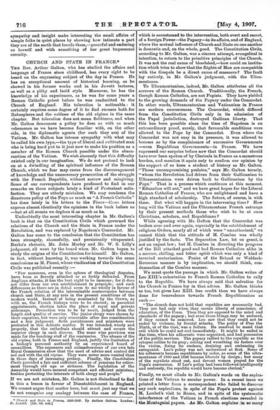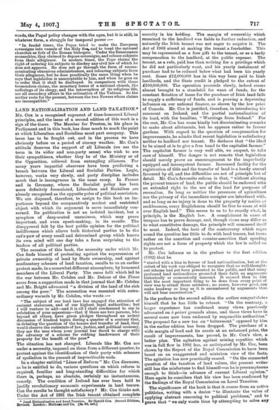CHURCH AND STATE IN FRANCE" Tun Rev. Arthur Galion, who
has studied the affairs and language of France since childhood, has every right to be beard on the engrossing subject of the day in France. He has an exceptional amount of historical learning, as be showed in his former works and in his Jowett lectures, as well as a pithy and lucid style. Moreover, be has the knowledge of his experiences, as be was for some years a Roman Catholic priest before he was readmitted to the Church of England. His toleration is noticeable : it certainly requires some degree of it to find excuses both for Robespierre and the noblesse of the old regime in the same chapter. But toleration does not mean flabbiness, and when Mr. Galion denounces a policy he does so with as much vehemence as we have become familiar with, on the other side, in the diplomatic agents (for such they are) of the Vatican. Mr. Galion has intense sympathy with what may be called his own type,—the type of liberal and cultivated man who is being hard put to it just now to make his position as a member of the Roman Church possible under the obscu- rantism of the Vatican. We wish sincerely that this difficulty existed only in our imagination. We do not pretend to look on at a dwindling of the spiritual influence of the Roman Church, which we fear may ensue from the discouragement of knowledge and the unnecessary prosecution of the struggle with the French Republic, without sorrow and misgiving. Some of our correspondents have professed to find in our remarks on these subjects lately a kind of Protestant satis- faction. They are utterly mistaken. We may condemn the disastrous policy of the Pope as much as "A French Catholic" has done lately in his letters to the Times—those letters express almost identically the opinions in the book before us —but at all events we deplore it as much as he.
Undoubtedly the most interesting chapter in Mr. Gallon's book is that on the Constitution Civile which governed the relations of the Church and the State in France under the Revolution, and was replaced by Napoleon's Concordat. Mr. Galion has come to the conclusion that the Constitution has been strangely, shamefully, and persistently vituperated. Burke's rhetoric, Mr. John Morley and Mr. W. S. Lilly's judgment, all went by the board when Mr. Galion began to study the origins of the Constitution for himself. Mr. Galion, in fact, without knowing it, was working towards the same conclusions as M. Pisani, whose vindication of the Constitution Civile was published recently :-
"Few measures, even in the sphere of theological disputes, have been so fiercely attacked or so feebly defended. From Anglican attacks, it has the best right to be immune; for it does not differ from our own establishment in principle ; and such differences as there are in detail seem to me wholly in favour of the French solution of the interminable controversies between church and State, at any rate in the present conditions of the modern world. Instead of being nominated by the Crown, as with us, the French bishops were to be elected ; in parochial appointments, election takes the place of royal and private patronage. Promotion was to be by merit, judged from the length and quality of service. The junior clergy were chosen by their superiors, but were only removable after due consideration and a fair judgment. Both parishioners and ministers were protected in this delicate matter. It was intended, wisely and properly, that the cathedrals should attract and secure the superior clergy in each diocese. The same wise provision was made for the teaching staff of the seminaries. The abuses of the old regime, both in France and England, justify the limitation of a bishop's personal authority by an experienced board of councillors. The exposures and animadversions of our own late Royal Commission show that the need of advice and control did not end. with the old regime. They were never more wanted than in these days of increasing prelacy. Finally, the Constitution Civile provided a fair and sufficient scheme of pensions for retire- ment through old age or sickness. The legislation of the Assembly would have secured competent and efficient ministers, besides protecting the interests of both clergy and people."
If we are not mistaken, Mr. Galion is not disinclined to find in this a lesson in favour of Disestablishment in England. We cannot argue that matter here, but must just say that we do not recognise any analogy between the ease of France, • Church mut State in Nem% 1800-1007. By Arthur Gallen. London, 112s. ed. nat.] which is accustomed to the intervention, both overt and secret, of a foreign Power—the Papacy—in its affairs, and of England, where the mutual influence of Church and State on one another is domestic and, on the whole, good. The Constitution Civile, according to Mr. Gallon, was a sincere attempt, evangelical in intention, to return to the primitive principles of the Church. It was not the real cause of bloodshed,—how could an institu- tion which tries to show that the Rights of Man are compatible with the Gospels be a direct cause of massacre P The fault lay entirely, in Mr. Galton's judgment, with the Ultra- montanes.
To .Ultramontanism, indeed, Mr. Galion attributes all the sorrows of the Roman Church. Traditionally, the French, though Roman Catholics, are not Papists. They have yielded to the growing demands of the Papacy under the Concordat. In other words, Ultramontanism and Vaticanism in France are modern excrescences. The Concordat, which differed from the Constitution Civile only in its admission of the Papal jurisdiction, destroyed Galilean liberty. That this has been possible since the time of Napoleon is an extraordinary proof, surely, that favourable conditions were allowed to the Pope by the Concordat. Even where the Concordat was not easy in its pressure, it was allowed to become so by the complaisance of successive Governments —even Republican Governments—in France. We have expressed our surprise before now that the Concordat should have ever been spoken of by Clericals in France as a monstrous burden, and mention it again only to confirm our opinion by the support of so keen a student of history as Mr. Galion. "Those uncompromising prelates," says Mr. Gallon tersely, "whom the Revolution had driven from their Gallicanism to Ultramontanism were driven back to Gallicanism by the Pope." That is a process which continues at this moment. "Education will out," and we have great hopes for the Liberal Roman Catholics of France, who are enlightened and have a high standard of scholarship. The future, of course, is with them. But what will happen in the intervening time P How long will the Vatican and the Ultramontane French estrange by their present methods those who wish to be at once Christians, scholars, and Republicans ?
While agreeing with Mr. Galion that the Concordat was broken over and over again, especially hi the establishment of religious Orders, nearly all of which were " unauthorised," we cannot think that the attitude of M. Combes was wholly justified by the facts. The Separation Law, let us grant, is not an unjust law ; but M. Combes in directing the progress of the Bill attacked good and bad Roman Catholics alike in a narrow, chilling, and bitter spirit which was only a kind of inverted sectarianism. Praise of the Briaud or Waldeck- Rousseau manner is by implication, we should think, con- demnation of the Combes manner.
We must quote the passage in which Mr. Galion writes of Leo XIII.'s exhortation to French Roman Catholics to rally to the Republic. We have always said that salvation for the Church in France lay in that advice. Mr. Galion thinks so too, but gives Leo XIIL less credit than we have always done for benevolence towards French Republicanism as such :— "The church does not hold that republics-are necessarily bad. They are bad only when they secure liberty of conscience, of education, of the Press. Then they are opposed to the mind and standards of the papacy; but even these things may be endured, if they cannot be removed. Leo saw that they could not be ended by violence, by frontal attacks. The policy of Pius the North, or of the Get,, was a failure. He resolved to mend that evil which he could not end immediately. It might be ended in due time, when his adherents were organized, and had possession of the public services. The papacy rallied to the republic as the octopus rallies to its prey; coiling and wreathing its feelers over the victim; fixing its suckers, draining and embracing its antagonist. Leo's policy was not understood at first. Some of his adherents became republicans by order, as some of the ultra- montane"' of 1830 and 1848 became liberals by design ; but many of the royalists stood out, and devout women prayed for the Pope's conversion. If Leo's policy had been followed intelligently and zealously, the republic would have become clerical."
Finally, we must allude to Mr. Gallon's words on the aspire• tions of the Vatican to secular power. In a recent issue we printed a letter from a correspondent who failed to discover any such aspirations, in spite of the Pope's protest against Lonbet's visit to Rome, and in spite of the systematic interference of the Vatican in French elections revealed in the Montagnini papers. As Kr. Galion explains:in so many.
words, the Papal policy changes with the ages, but it is still, in whatever form, a struggle for temporal power :—
" In feudal times, the Popes tried to make the European sovereigns into vassals of the Holy Sea. and to treat the national churches as fiefs of the Roman bishopric. Under the Renaissance monarchies, they claimed to depose sovereigns, and release subjects from their allegiance. In modern times, the Popo claims the right of ordering his subjects to disobey any civil law of which he does not approve. He does not go through the form of excom- municating obnoxious administrators, and releasing subjects from their allegiance, but he does practically the same thing when he says that legislation is unacceptable to him, and when he goes on to order that it shall be disobeyed. In comparison with these tremendous claims, the monetary losses of a national church, the sufferings of its clergy, and the interruption of its religious life, aro all secondary affairs in the estimation of the Vatican. So the matter rests for the present, between the two Powers whose claims are incompatible."















































 Previous page
Previous page